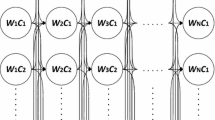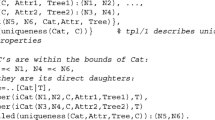Abstract
This paper describes a system that performs hierarchical error recovery, and detects and corrects a single error in a sentence at the lexical, syntactic, and/or semantic levels. If the system is unable to repair an erroneous sentence on the assumption that it has a single error, a multiple error recovery system is invoked. The system employs a chart parsing algorithm and uses an augmented context-free grammar, and has subsystems for lexical, syntactic, surface case, and semantic processing, which are controlled by an integrated-agenda system. In the frequent case that there is a choice of possible repairs, the possible repairs are ranked by penalty scores. The penalty scores are based on grammar-dependent and grammar-independent heuristics. The grammar-independent ones involve error types, and, at the lexical level, character distance; the grammar-dependent ones involve, at the syntactic level, the significance of the repaired constituent in a local tree, and, at the semantic level, the distance between the semantic form containing the error, and normal act templates. This paper focuses on single error recovery.
Preview
Unable to display preview. Download preview PDF.
Similar content being viewed by others
References
Anderson, S. and Backhouse, R. (1981). Locally Least-cost Error Recovery in Earley's Algorithm. ACM Transactions on Programming Languages and Systems, 3(3): 318–347.
Carbonell, J. and Hayes, P. (1983). Recovery Strategies for Parsing Extragrammatical Language. American Journal of Computational Linguistics, 9(3–4): 123–146.
Damerau, F. (1964). A Technique for Computer Detection and Correction of Spelling Errors. Communications of the ACM, 7(3): 171–176.
Fass, D. and Wilks, Y. (1983). Preference Semantics, Ill-formedness, and Metaphor. American Journal of Computational Linguistics, 9(3–4): 178–187.
Grishman, R. and Peng, P. (1988). Responding to Semantically Ill-Formed Input. The 2nd Conference of Applied Natural Language Processing, 65–70.
Irons, E. (1963). An Error-Correcting Parse Algorithm. Communications of the ACM, 6(11): 669–673.
Kato, T. (1994). Yet Another Chart-Based Technique for Parsing Ill-formed Input. The Fourth Conference on Applied Natural Language Processing, 107–112.
Lyon, G. (1974). Syntax-Directed Least-Errors Analysis for Context-Free Languages: A Practical Approach. Communications of the ACM, 17(1): 3–14.
Mellish, C. (1989). Some Chart-Based Techniques for Parsing Ill-Formed Input. ACL Proceedings, 27th Annual Meeting, 102–109.
Min, K. and Wilson, W. H. (1995). Are Efficient Natural Language Parsers Robust?. Eighth Australian Joint Conference on Artificial Intelligence; 283–290
Mitton, R. (1987). Spelling Checkers, Spelling Correctors and the Misspellings of Poor Spellers. Information Processing and Management, 23(5): 495–505.
Peterson, J. (1980). Computer Programs for Detecting and Correcting Spelling Errors. Communications of the ACM, 23(12): 676–687.
Vosse, T. (1992). Detecting and Correcting Morpho-Syntactic Errors in Real Texts. The Third Conference on Applied Natural Language Processing, 111–118.
Weischedel, R. and Sondheimer, N. (1983). Meta-rules as Basis for Processing Informed Input. American Journal of Computational Linguistics, 9(3–4): 161–177.
Young, C., Eastman, C., and Oakman, R. (1991). An Analysis of ill-formed Input in Natural Language Queries to Document Retrieval Systems. Information Processing and Management, 27(6): 615–622.
Author information
Authors and Affiliations
Editor information
Rights and permissions
Copyright information
© 1997 Springer-Verlag Berlin Heidelberg
About this paper
Cite this paper
Min, K., Wilson, W.H. (1997). Integrated correction of ill-formed sentences. In: Sattar, A. (eds) Advanced Topics in Artificial Intelligence. AI 1997. Lecture Notes in Computer Science, vol 1342. Springer, Berlin, Heidelberg. https://doi.org/10.1007/3-540-63797-4_90
Download citation
DOI: https://doi.org/10.1007/3-540-63797-4_90
Published:
Publisher Name: Springer, Berlin, Heidelberg
Print ISBN: 978-3-540-63797-4
Online ISBN: 978-3-540-69649-0
eBook Packages: Springer Book Archive




